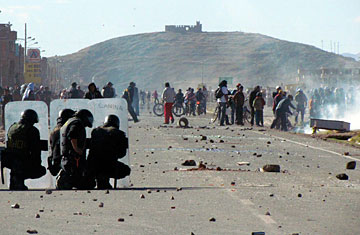
Peruvian anti-riot police confront some of the 1,000 protesters, mostly Aymara indigenous farmers, who are trying to reach Juliaca's airport, 1,400 km southeast of Lima in the Puno region, on June 24, 2011
As a hearse bearing the body of Raúl Cancapa made its way through the dark streets of Juliaca, a city in the Andes in southern Peru, on Saturday evening, June 25, the mourners tailing the procession solemnly chanted for justice. Cancapa's widow walked with her relatives and gave a quick interview to local media before bursting into tears and being escorted into a car. "She's in too much pain to talk," said the brother of the dead man. The smell of burning tires filled the air as the convoy meandered through roadblocks in the besieged town. At a stop, a middle-aged man said Cancapa, 28, had not deserved to die, declaring, "The President should be punished for what has happened here." As the procession passed by the airport, where Cancapa was killed, a couple of ladies swept up remnants of shattered glass.
Twenty-four hours before in the same spot, Cancapa, a farmer from San Anton, took part in one of the biggest protests to rock southern Peru in years. Joined by thousands who had come from throughout the region, Cancapa traveled two hours to Juliaca to demonstrate against the ongoing contamination of local waters, allegedly by Bear Creek, a Canadian mining company. The organizers of the campaign demanded that the government of President Alan García, who leaves office at the end of July, revoke its concession to the company. However, when the protesters approached the airport, fighting broke out, and the heavily armed police fired live rounds to disperse the crowds. Cancapa was hit in the chest and died immediately, one of six acknowledged by the government to have been killed over the weekend. Protesters assert that the number of dead is much higher.
The protesters, mainly made of up of indigenous Aymarans, say they were inspired to take to the streets after the Peruvian government gave in to similar demands from separate protests in the Puno region, where Juliaca is located. Their concerns are local and modest. Hernán Cancapa says his brother Raúl's flock of sheep were suffering from the alleged effects of the mine's pollution. Healthy sheep were part of Raúl's plan to save up to start a bakery and provide for his three young children.
With other protests having blocked key trade routes to Bolivia for weeks, the government agreed to negotiations in Lima last week, revoking Bear Creek's mining concessions. In Juliaca, Cancapa and other Aymara activists sought similar results as well as a cleanup of local waters; they descended on the Juliaca airport, the main tourist gateway to Lake Titicaca, to draw attention to their plight. Then the shooting took place, and the protests turned into much more than just anticontamination demonstrations.
On Friday evening, as news spread about the deaths of Cancapa and other protesters, people left the roadblocks surrounding the city and gathered at the end of the airport runway, where protesters engaged in a fierce battle with police. On one side, demonstrators, some in traditional Aymaran clothing and bowler hats, threw fireworks and homemade bombs at police, who responded with tear gas, rubber bullets and live rounds. "It is like war," said Ernando Sanchez, 22, an engineering student who was taking a break from the battle. "They started it by killing our brothers. They responded heavily. We have to take back the airport now." As dark arrived, the mood grew increasingly tense, and local students hearing about the killings joined the protest ranks. Riots broke out throughout the city.
The next day, the effects of the unrest were visible throughout the city. At the airport runway, a funeral was held for another victim of the violence, a 45-year-old man whose body, bruised and charred, was laid out on the road surrounded by candles in a makeshift memorial enclosed by removed airport fence. Next to him, his wife wept furiously as an enraged mob gathered to discuss what the protesters should do next. "What are you doing here? We don't want press," a woman said to me, angered by the sight of an Anglo — the current embodiment of the international corporations that the Aymara believe are to blame for the deaths and contamination. "President García has sold our country. We have nothing left, so we must fight to defend our land," she said. The crowd around the dead body grew increasingly larger as people in turns released emotions and grievances.
Signs of anger toward the government and foreign companies were seen throughout the city. Anything that represents a foreign interest has been affected in some way. Bank windows have been smashed with rocks; a Chilean supermarket's walls have been cracked; and the doors of a foreign-owned pharmacy chain downtown were broken in. "The people are not normally violent, but their livelihood is being destroyed by outsiders," said one woman. Like many around the city, she was tying a black bag to a Peruvian flag to mourn the dead.
